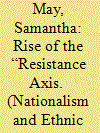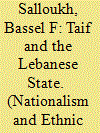|
|
|
Sort Order |
|
|
|
Items / Page
|
|
|
|
|
|
|
| Srl | Item |
| 1 |
ID:
165177


|
|
|
|
|
| Summary/Abstract |
Forty years ago, Salim Nasr identified a “crisis of Lebanese capitalism” as a “backdrop” to the country’s civil war. Thirty years after Taif, Lebanese capitalism is facing another crisis: public debt, a looming currency crisis, failing public services. Explanations that focus solely on the sectarian “weak state” or on Syrian refugees neglect the crucial importance of Lebanon’s dependence on Gulf rentierism. Using recent studies of income and poverty, this article shows how postwar capitalism benefited rentier capitalists at the top, created a precarious middle class, and perpetuated poverty. Economic protests mobilize the precarious middle and they revolve around failing public services.
|
|
|
|
|
|
|
|
|
|
|
|
|
|
|
|
| 2 |
ID:
165175


|
|
|
|
|
| Summary/Abstract |
In the past decades, New Institutionalism in political science has rekindled an interest in the role of institutions and has theorized the interaction between formal and informal institutions. Unfortunately, little of this has made its way into the consociational literature. This article brings together the two bodies of work, focusing on the case of Lebanon because it allows for a unique analysis over time of the different ways in which consociational features have been institutionalized. The National Pact of 1943 was a gentleman’s agreement between the political leaders of the two main religious communities. It formed the basis of a consociational system that lasted for decades. After the civil war, the Taif Agreement reintroduced consociationalism, but this time more institutions were constitutionalized. However, it would be mistaken to view this as a simple contrast between informal (pre–civil war) versus formal (post–civil war) consociationalism, because even today the most important consociational institution is informal. This article traces the development and interaction of informal and formal consociational institutions in Lebanon. In doing so, it contributes not only to the consociational literature and the debate about the merits of liberal versus corporate consociations, but also to New Institutionalism and questions about the relative strength of formal versus informal institutions.
|
|
|
|
|
|
|
|
|
|
|
|
|
|
|
|
| 3 |
ID:
165179


|
|
|
|
|
| Summary/Abstract |
The aim of this article is to distinguish between two levels of collective memory in Lebanon: the national memory, which is a very weak and fragile memory, and the communal memory of sectarian groups. Each community in Lebanon enjoys a memory of its own, which it tries to elevate to the national memory, but at the same time intra-sectarian groups contest their internal memories with others. Hence, we see that communities try to force the state to adopt their respective memories, while internally groups tend to eliminate their competitor’s memory and communal narrative.
|
|
|
|
|
|
|
|
|
|
|
|
|
|
|
|
| 4 |
ID:
165173


|
|
|
| 5 |
ID:
165174


|
|
|
|
|
| Summary/Abstract |
The article looks at the legacy of consociationalism in Lebanon with the aim of illuminating some insights on the linkages between power-sharing and conflict resolution in the post-2011 Middle East. It highlights three core dilemmas or governance traps that have recurred in Lebanon’s political dynamic: the power-sharing formula’s proneness to deadlock, its dependence on the external environment as an avenue for partisanship and sectarian leverage, and its weak responsiveness to demands from below. The article shows how these dilemmas are tightly linked to the politics of sectarianism. While Lebanon’s postwar transition (1990 onward) serves as a backdrop for exploring these dilemmas, emphasis is placed on the performance of Lebanon’s political system in the post–Arab Spring era. The aim is to assess whether Lebanon’s consociational performance has matured over time. The Lebanese experience brings into sharper focus the limitations of sectarian power-sharing. Still, it provides useful insights for reshaping the debate on power-sharing in divided societies of the Arab world.
|
|
|
|
|
|
|
|
|
|
|
|
|
|
|
|
| 6 |
ID:
165180


|
|
|
|
|
| Summary/Abstract |
Hezbollah’s direct military presence in Syria and Iraq confirms that their actions transcend Lebanon as a political stage. But why can Hezbollah still not be contained within the boundaries of Lebanon? Exploring how the Taif Agreements both tamed Hezbollah’s rhetoric while simultaneously laying the conditions for transnational activities, this article argues that the conditions of the Taif Agreement have assisted in the rise of Hezbollah’s self-coined Resistance Axis. Post-Taif, Hezbollah has tended relationships with the external forces that helped broker the peace while unlocking the potential in the exceptional decision to allow Hezbollah to retain arms in the name of “resistance.”
|
|
|
|
|
|
|
|
|
|
|
|
|
|
|
|
| 7 |
ID:
165176


|
|
|
|
|
| Summary/Abstract |
The political reforms adopted in the 1989 Taif Agreement created a veritable postwar paradox: a more balanced consociational power-sharing arrangement led to a bigger, more clientelist, more corrupt, less autonomous public sector, one preoccupied by predatory rentier practices along sectarian and clientelist lines. The more durable the power-sharing arrangement the less the state in Lebanon acts as a state with a measure of bureaucratic autonomy, extractive capacities, and a national agenda. This article problematizes this postwar anomaly by examining the instrumental role played by the public sector in the reproduction of the political elite’s clientelist ensemble undergirding the political economy of sectarianism.
|
|
|
|
|
|
|
|
|
|
|
|
|
|
|
|
| 8 |
ID:
165178


|
|
|
|
|
| Summary/Abstract |
This article examines three museums that address Lebanon’s history of conflict: the newly opened Beit Beirut on the capital’s former Green Line, the Hezbollah-run Mleeta Resistance Tourist Landmark in south Lebanon, and Umam Documentation and Research’s online archive “Memory at Work.” Each testing the parameters of what the term museum can mean in Lebanon today, these cases highlight the still-contested nature of war narratives. While many Lebanese youth express desire for a shared national history of the civil war, the affective complexities of recuperated memorial sites and the inconsistent involvement of the state suggest that the possibility of publicly staging such a history is far from secure.
|
|
|
|
|
|
|
|
|
|
|
|
|
|
|
|
|
|
|
|
|